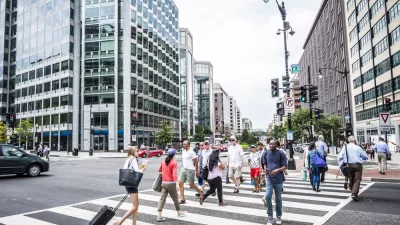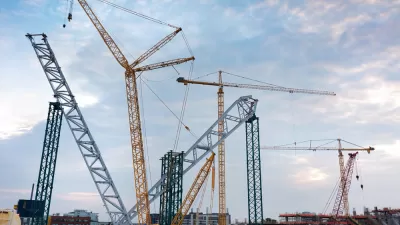Washington D.C.'s New Communities program has failed to live up to its titular promise, according to a new report released by the Office of the Deputy Mayor for Planning and Economic Development.
"In short," writes Aaron Wiener, "the New Communities program has failed to produce new communities."
The logic of the 2004 program spearheaded by then-Mayor Anthony Williams made sense, according to Wiener: "The city would both address the chronic problems that accompany concentrations of poverty and minimize the displacement of low-income residents by allowing them to return to the sites of their former homes after redevelopment."
However, "the execution, amid poor planning and a recession that slowed development countrywide, has left many residents frustrated."
Enter the report commissioned by the Office of the Deputy Mayor for Planning and Economic Development and released to the D.C. Council, which traces the struggles of the New Communities initiative "to unrealistic expectations that led to structural flaws in the program's design."
As for what's next, the report proposes solutions that "involve a strategic reshuffling of priorities to ensure that housing gets built, even at the possible expense of some of the program's ideals." Moreover, the D.C. Housing Authority, which oversees the city's public housing, has promised to "begin working with our city partners as the details in the recommendations are ironed out and as our commitment to our families is fulfilled."
FULL STORY: Report: D.C. Should Redevelop Public Housing Without Replacing Units First

Planetizen Federal Action Tracker
A weekly monitor of how Trump’s orders and actions are impacting planners and planning in America.

Map: Where Senate Republicans Want to Sell Your Public Lands
For public land advocates, the Senate Republicans’ proposal to sell millions of acres of public land in the West is “the biggest fight of their careers.”

Restaurant Patios Were a Pandemic Win — Why Were They so Hard to Keep?
Social distancing requirements and changes in travel patterns prompted cities to pilot new uses for street and sidewalk space. Then it got complicated.

Platform Pilsner: Vancouver Transit Agency Releases... a Beer?
TransLink will receive a portion of every sale of the four-pack.

Toronto Weighs Cheaper Transit, Parking Hikes for Major Events
Special event rates would take effect during large festivals, sports games and concerts to ‘discourage driving, manage congestion and free up space for transit.”

Berlin to Consider Car-Free Zone Larger Than Manhattan
The area bound by the 22-mile Ringbahn would still allow 12 uses of a private automobile per year per person, and several other exemptions.
Urban Design for Planners 1: Software Tools
This six-course series explores essential urban design concepts using open source software and equips planners with the tools they need to participate fully in the urban design process.
Planning for Universal Design
Learn the tools for implementing Universal Design in planning regulations.
Heyer Gruel & Associates PA
JM Goldson LLC
Custer County Colorado
City of Camden Redevelopment Agency
City of Astoria
Transportation Research & Education Center (TREC) at Portland State University
Camden Redevelopment Agency
City of Claremont
Municipality of Princeton (NJ)




























